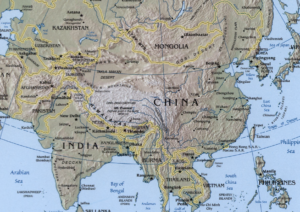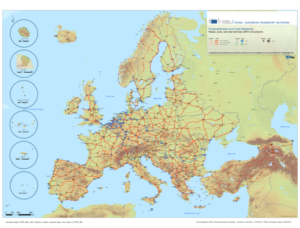- British Soft Power around the world could suffer from the Queen’s death.
- Another stressor for the UK economy that is already on the rise with the price of energy.
- The power of the British Monarchy over the Commonwealth Realms may be at the beginning of the end.
The death of Queen Elizabeth II in the United Kingdom may have more impacts on British external influence than one can imagine. More than just a monarch, Elizabeth had the longest rule in the Kingdom’s history.
The Queen began her reign while Great Britain held the status of a great imperial power, having been crowned in 1953, when the Suez Canal was under her control and the empire held protectorates and colonies in Africa, the Middle East and Asia.
Now, with her death and being succeeded by her son Charles III, the population and the world are wondering what the next step and the future of the United Kingdom will be.

The possible loss of British Soft Power that was exercised by Queen Elizabeth around the world
London’s soft power abroad will be a possible casualty due to the Queen’s death. It appears that in recent years the UK has seen a decrease in its influence and global power, which includes a significant military downsizing and a declining economy. Despite the problems faced by the union, it is possible that Elizabeth’s soft power has mitigated these negative effects.
It can be said that some of the main avenues of soft power for the union are institutions such as the BBC and the British Council – universities that attract thousands of academic talent from abroad, in addition to the Commonwealth itself, which we will cover below.
In addition, it must be considered that the English language also plays a fundamental role in this process, through songs and series that reach people all over the world daily.
However, for the last 70 years the Queen has served as London’s most important representative and her diplomacy has enchanted many heads of state through state and diplomatic visits during her reign.
Furthermore, Elizabeth fulfilled her duty to be apolitical, and this neutral stance has been favorable for UK International Relations.
However, even at the beginning of Charles III’s reign, many members of the public doubt his ability to sustain the position his mother held abroad, both politically and to defend the image of the Royal Family.
However, one of the first good impressions that the public has of Charles is his engagement in the environment and climate change issues, which can be favorable to him.
The Future of the British Economy with the Death of Queen Elizabeth
The external member of the Monetary Policy Committee of the Bank of England, Catherine Mann, stated in an interview that the British economy has not yet returned to the pre-pandemic trend and now, after the death of the Queen, the trend is worsening.
The national holiday decreed by King Charles III for the day of his mother’s funeral, September 19, 2022, when combined with the economic impact of the previous ten days’ national mourning period, directly affects consumer sentiment and can be further most damaging to business in the UK.
The economy already affected by energy prices, due to the war between Russia and Ukraine, is hitting domestic finances and the public’s fear is growing about the health of the economy as inflation rises.
Philip Shaw, chief economist at Investec bank, said: “It could be that the impact of the bank holiday itself is relatively limited. What we don’t know is how the Queen’s death will affect the national mood and whether that results in less trust and spending.”
The economist explains that when there is an extra bank holiday, the tendency is for GDP to decrease because there are fewer people working, and declared that “it is quite possible that there will be a contraction throughout the month as a whole, which makes the economy get smaller over the next few months.”
He said a contraction in the next few months would mean a recession starting earlier than economists expected and added: “We have a similar effect with Princess Diana’s death.”
Shaw says official data shows retail sales plummeted in the month following Diana’s death in 1997. Many stores closed on her funeral day as leisure operators, including movie theaters, suffered business slumps. However, there was a rebound in sales the following month.
Therefore, the next steps taken by the British government will be instrumental in the improvement or further decline of the British economy which has been deeply affected by the lockdowns of the COVID-19 pandemic; the current war in Ukraine, and consequently the energy crisis; and the death of Queen Elizabeth II.
King Charles III and the Future of a Weakened Commonwealth
The death of Queen Elizabeth II has fueled a new debate in many Commonwealth countries – most of them former British colonies – about their future ties to the monarchy.
The Commonwealth, or Commonwealth of Nations, is a political association formed by 56 countries and 14 of which, in addition to the United Kingdom, are Commonwealth Kingdoms as they have King Charles III as head of state.
Nine of those 14 Kingdoms are in the Americas, while the remaining five are in Oceania. Many of them are island nations, but there are also some large continental territories, such as Canada and Australia.
The countries that make up the Commonwealth Kingdoms are: Antigua and Barbuda, Australia, Bahamas, Belize, Canada, Grenada, Solomon Islands, Jamaica, Papua New Guinea, New Zealand, Saint Kitts and Nevis, Saint Lucia, Saint Vincent and the Grenadines and Tuvalu.
However, not all countries are satisfied and some of them are considering abandoning the monarchy and becoming republics. Scottish journalist and former BBC presenter Andrew Neil told the Daily Mail: “She was the glue that held our nation together for as long as most of us can remember… and with her gone, the risk of that union letting go and falling apart on many fronts is even greater.”
Scotland wants to move forward again with a new proposal for an independence referendum so that the vote takes place in October 2023, so that the population can choose between staying or leaving the United Kingdom, as in 2014, when the result was for the country to remain.
However, after Brexit and the election of a nationalist party, the outcome may be different. The dissatisfaction of the population that left the European Union (EU) may want to declare the country’s independence and, if that happens, it is possible that Scotland will plead its return to the European bloc.
In Barbados, then-Prince Charles witnessed the island’s transition from monarchy to a republic and said: “The creation of this republic offers a new beginning. From the darkest days of our past and the atrocity of slavery that forever stains our history, the people of this island forged their path with extraordinary fortitude.”
In Antigua and Barbuda, questions about the role of the monarchy in the region were raised after the visit of Prince William and Princess Kate to Belize, Jamaica and the Bahamas to celebrate the 70th anniversary of Queen Elizabeth II on the throne.
The trip was fraught with impasses and they were told by the Jamaican prime minister that the country was moving forward and would achieve its true ambition of being independent.
New Zealand Prime Minister Jacinda Ardern spoke out after the Queen’s death saying the country is likely to become a republic in the future, but not now. She added that “This is a broad and significant debate. I don’t think it’s a debate that will or should happen quickly.”
In Australia, voices for change are also becoming significant, and apparently what kept the system going to this day was Queen Elizabeth II herself.
Future trend of British influence around the world with the new King Charles III
The Queen’s death will undoubtedly cause changes to the system we know today.
So, it is possible that initially British soft power may temporarily increase, due to the worldwide attention focused on them through all the media generated by the death and funeral of the Queen as well as the future coronation of King Charles.
However, after some time it is not known of the King’s ability to sustain this soft power in a positive way, due to his relative low popularity when compared to his mother and his own son and successor, Prince William.
Therefore, it is possible that the environmental cause will become a major issue during his reign, despite not being able to publicly record his own opinions on policy issues and having to accept government policies.
The British economy does not seem to have a quick way out of the energy crisis, nor does it seem to have a post-pandemic economic recovery forecast. Therefore, an unfavorable economic situation is to be expected for the coming months and perhaps years.
Finally, the Monarchy seems to be in check. With the death of Queen Elizabeth, and the independence of Barbados in 2020, the tendency is for other Commonwealth nations to follow the same path towards the republic.
On the other hand, the British presence in NATO and in the informal QUAD security cooperation group in the Indo-Pacific region, should maintain the influence of London’s hard power around the world for the foreseeable future.














Be First to Comment